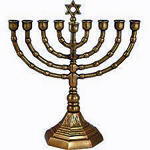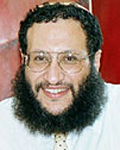|
MY HANUKKAH STORY
By Mottel Baleston
|
"Without
Hanukkah, there would be no Christmas." |
Let
me describe a true event:
The year was 1960, the place was Brooklyn,
part of New York City, and in a housing project a
six year old boy looked up at an eight story
apartment building. All eight living rooms are
stacked one above another, and in the early winter
twilight, each window displayed the same thing: the
twinkling lights of a Jewish Hanukkah Menorah. It
was the eighth and final night of Hanukkah, all
eight lights, plus the servant light, glowed
brightly. Looking around, the boy saw an even more
remarkable sight. For it was in those other
buildings surrounding him that he saw a total of 23
apartment buildings sitting on a single plot of
land. The vast majority of all these other living
rooms also had Hanukkah Menorahs burning brightly.
It was easy for the boy to imagine, as he did, that
most of the world was Jewish!
I was that boy.
During those years, the housing project where I grew
up, home to over 1,600 families, was about 90
percent Jewish. When December came, we celebrated
Hanukkah. For eight nights we celebrated Hanukkah.
We participated in all the warm rituals of the
holiday. We lit the candles on the Hanukkah Menorah,
we spun the “Dreidel”, (the spinning toy with Hebrew
letters on each side), and depending upon which
letter was on top, we either won or lost. Oh yes,
and we ate! We ate the traditional Potato Latkes, a
type of pancake, and ate them with either sour cream
or apple sauce. In the Synagogue across the street,
they had a special Hanukkah service for kids, and at
the end, your reward was even more Potato Latkes, so
I made sure not to miss it!
Our traditions were those of the European Jewish
community, and since all four of my grandparents
were from Jewish communities in eastern Europe, that
is the tradition we kept. Oh, I almost forgot ... on
the first night of Hanukkah we also received gifts,
sometimes presents, but more often something called
“Hanukkah Gelt”, gold foil-wrapped chocolate shaped
to look like coins; a reminder of times in Europe
when real coins were given on the first night of
Hanukkah.
Not too long after this, I became aware that Jews
were not the majority in the world. While my public
school was mostly Jewish, there were a fair number
of Catholics as well. And once December rolled
around, these Catholics would eagerly ask fellow
Jewish kids, “How are you going to celebrate your
Jewish Christmas?" We indignantly responded that we
don’t celebrate Christmas. We were happy with
Hanukkah. And so, as children often do, the Catholic
kids pointed out, in a teasing way, that their
holiday displays had more lights. For they had a
Christmas Tree and we didn’t, and Santa brought them
many presents.
As the school years went on, I often heard the
tease, “Hanukkah is just a cheap version of
Christmas.”
I became resolute not to join in the majority
celebration, or to mix the two holidays, as more and
more Jews were doing with such new innovations as
Hanukkah greeting cards and “Hanukkah Bushes.”
Left out of all these cultural disputes was a
poignant and ironic truth: The Jesus of Christmas
actually celebrated Hanukkah!
Fast forward some years. Now in my early 20’s, I
came to saving faith in Jesus as my Messiah. I did
not come to believe in Him as a way to escape being
Jewish, nor to assimilate, nor as a reason to put up
a Christmas tree. Rather, as I recognized that the
Jewish Bible promised a Jewish Messiah to the Jewish
people, it was clear that Yeshua of Nazareth, the
one the western world calls Jesus, is the only one
who matched the prophecies found in the Hebrew
Scriptures.
As a believer, I now wanted to understand what the
Jewish holidays truly meant, and I found that many
believers from non-Jewish backgrounds had a
new-found interest in the Jewish roots of their
Christian faith as well.
So for all of you, whether from Jewish or non-Jewish
backgrounds, here are some Hanukkah basics:
Hanukkah, also known as the Festival of Lights, is
celebrated for eight days beginning on the 25th day
of the month of Kislev, a Hebrew month that runs
from approximately the middle of November through
the middle of December. The word Hanukkah in Hebrew
means “dedication,” as the holiday commemorates the
rededication of the Jewish Temple in Jerusalem for
the service of God, and the victory over the
Hellenist Syrians in 164 BCE. This time period is
sometimes
known in Christian circles as the “ 400 silent
years,” that time between the close of the Old
Testament and the start of the New Testament. In
reality, those years were not silent, but rather
momentous, and were foretold in the Book of Daniel.
The background is simple: After returning to the
land from the Babylonian captivity, the spiritual
state of our Jewish people declined. When Greek
Hellenism was introduced to Israel as a result of
Alexander the Great's occupation of the Holy Land,
aspects of Greek culture were attractive to some
Jewish people. Some Jewish families ceased to
circumcise their sons and abandoned the food
regulations of the Mosaic Law. Others went further
and placed Greek idols in their homes. These serious
compromises and assimilations weakened the Jewish
people to the point where the Syrian Hellenists,
heirs of Alexander the Great, made a bold demand of
the remaining Jews - give up the worship of the God
of the Scriptures, and fully adopt Greek paganism
... OR, be killed.
The Maccabees, sons of the Jewish Priest Mattathias,
led the Jewish people in a hard-fought revolt
against the Syrians. They finally entered the Temple
which had been defiled by the Syrian invaders,
cleansed it and dedicated it anew to the service of
God. Then, in memory of their victory, the Maccabees
celebrated the first Hanukkah.
Jewish tradition relates how the Judean heroes, led
by Judah Maccabee, wanted to rededicate the Temple
but were unable to find enough undefiled oil to
light the 7 branched Menorah (lampstand) that stood
in the "Holy Place" of the Temple; however, in one
of the Temple rooms, they finally found a small jar
of oil which was enough for just one evening.
Miraculously, this small amount of oil kept
the Temple lights burning, (not for one night, but
for all eight nights) until new oil for use in the
Temple could be made. This is the miracle remembered
by the kindling of the Hanukkah lights according to
Jewish tradition. Other Jewish sources point out
that the older, and probably more accurate reason
for the 8 nights of celebration is the effort by the
Maccabees to make up for the missed 8-day
celebration of the Feast of Tabernacles, which they
were unable to observe in Jerusalem due to the
Syrian occupation.
Today, the most important observance associated
with Hanukkah is the kindling of the Hanukkah lights
on the Hanukkah Menorah, the nine-branch lampstand
used for this Holiday only. On each night, one more
light is kindled, beginning with one candle on the
first night of Hanukkah and ending with eight on the
final evening. The lighting is accompanied by the
chanting of the traditional blessings, and the
singing of songs. The ninth branch is the shamash
(the servant light) which is lit first and used to
kindle the other lights of the Menorah each evening.
Messiah Yeshua observed Hanukkah throughout His life
and is seen in the New Testament traveling to be in
Jerusalem during this Holiday (John 10:22). Did you
catch the irony in that? The one biblical mention of
the Jewish holiday of Hanukkah is in the New
Testament as it is being observed by Jesus, both of
which are rejected by the majority of Jews. On that
occasion in Jerusalem, Yeshua made a clear claim to
be the Messiah, v.23-25.
We find several important lessons in Hanukkah for
all believers:
1) Even when times are difficult for our Jewish
people, God always keeps His Covenant promises to us
(Gen 12:1-3) by sending us a prophet, leader or hero
to guide us back to God's truth, helping us triumph
over our enemies. While the Maccabees were used by
God, the greatest example of this is the arrival of
Messiah Yeshua, who provided a permanent atonement
and a way back to the God of Abraham, Isaac
and Jacob.
2) Accommodation with the sin and neo-paganism of
our world is just as toxic to believers today as it
was to the Jews of the Maccabean era.
3) The goal of the pagan Hellenists was to destroy
the Jewish people as a nation. If they had been
successful, there would have been no Tribe of Judah,
no virgin Mary, and no Jesus! Without Hanukkah,
there would be no Christmas.
4) Hanukkah is one of three Jewish holidays that can
be summed up in three humorous phrases:
a. They tried to kill us.
b. We won.
c. Let’s eat.
Those holidays are Passover, as we celebrate the
victory over Pharaoh and his armies, Purim, which
remembers the triumph of the Jews of Persia when
Haman had conspired to have them all killed, and our
consideration of Hanukkah. All three celebrations
are accompanied by specific foods.
Whether you spell it Hanukkah, Chanukah, or any
other variation, the message is the same. As
believers, we know our effectiveness for Yeshua is
compromised by entanglement with today's equivalent
of paganism. We should be modern day Maccabees,
having sole devotion to the God of Israel and His
Kingdom.
My Hannukah Story
~ a messianic study ~
© Mottel Baleston
|
"My Hannukah Story" was originally
featured in Ariel Ministries' Fall 2011 Magazine, Volume 1, Number 2.
It also appeared in the November 2012 edition of
The Shofar, Ezine 34.
Mottel Baleston
is the AMC Board Secretary,
the director of Messengers Messianic Jewish Outreach of New
Jersey, and a teacher at Ariel’s School of
Messianic Jewish Studies.
He served for 16 years as
Messianic Rabbi or Associate Rabbi at Beth
Messiah Congregation in Livingston, New Jersey.
For much more about Mottel and his present
activities, please go to
http://www.messiahnj.org/director.htm.
Links to other articles by
Mottel may be found in our
Library. |
Return to Home Page

|


